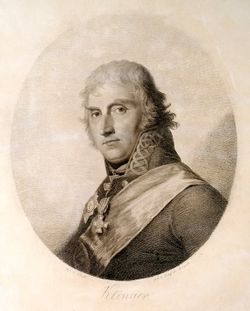Friedrich Maximilian Klinger
| Friedrich von Klinger | |
|---|---|

Klinger in an 1807 etching by Karl August Senff
|
|
| Born |
Friedrich Maximilian von Klinger 17 February 1752 Free Imperial City of Frankfurt |
| Died | 25 February 1831 (aged 79) Dorpat, Russian Empire |
| Occupation | Dramatist, novelist, military officer |
| Language | German |
| Education | University of Gießen |
| Literary movement | Sturm und Drang |
| Notable awards |
|
| Spouse | Elisabeth Alexajef (m. 1788) |
Friedrich Maximilian von Klinger (17 February 1752 – 25 February 1831) was a German dramatist and novelist. His play Sturm und Drang (1776) gave name to the Sturm und Drang artistic epoch. He was a childhood friend of Johann Wolfgang von Goethe and is often closely associated with Jakob Michael Reinhold Lenz. Klinger worked as a playwright for the Seylersche Schauspiel-Gesellschaft for two years, but eventually left the Kingdom of Prussia to become a General in the Imperial Russian Army.
One of the few eighteenth-century authors from the lower social class, Klinger was born of humble parentage in Frankfurt am Main. His father, Johannes Klinger, was a town constable who died when Klinger was just eight years old, forcing his mother Cornelia Fuchs Klinger, a sergeant's daughter, to support her son and two daughters by taking in laundry from the Frankfurt elite—including, perhaps, Klinger's future friends and patrons, the Goethes of Hirschgrabenallee. In spite of this misfortune, however, Klinger excelled in his studies and was awarded a tuition waiver to study at the gymnasium where he also raised funds for his family by working as a tutor.
Though there is little documentation of Klinger's earliest interactions with Goethe during their Frankfurt years, they appear to have made acquaintance by 1773, as Klinger had begun work on his first dramas, Otto and Das leidende Weib (The Suffering Wife) which, according to his Leipzig publisher, owe a great debt to Goethe's then-unpublished Götz von Berlichingen mit der eisernen Hand. Weygand released the collection at its Easter book fair of 1775, calling them "plays in the Goethean/Lenzian Manner." Additionally, it was only with Goethe's financial assistance that Klinger was able to enroll at the University of Gießen in 1774 where he briefly studied to be a legal clerk.
...
Wikipedia
